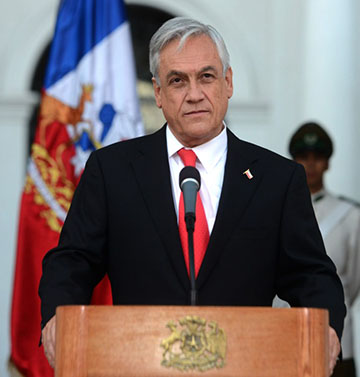 Chile’s President Sebastian Piñera deserves applause for his bill to impose a nationwide ban on single-use plastic bags. He wants to help save the world’s increasingly polluted oceans, and it’s a move that all countries should follow.
Chile’s President Sebastian Piñera deserves applause for his bill to impose a nationwide ban on single-use plastic bags. He wants to help save the world’s increasingly polluted oceans, and it’s a move that all countries should follow.
Piñera made the announcement this week, citing United Nations and independent studies showing that 8 million tons of plastic waste worldwide end up in the oceans every year, and that these plastic bags and bottles take about 400 years to fully disintegrate.
That’s killing marine life and poisoning our food, because fish are increasingly eating plastic particles. In addition, large numbers of seals, turtles and fish die because they become entangled in huge clusters of debris.
“Plastic bags are causing a serious damage to our nature, to our environment and to our health,” Piñera said on his Facebook page. He added that, just in Chile’s capital, people use an estimated 62.2 million single-use plastic bags a year, and that plastic waste has created “an island of plastic bags of the size of a country like Mexico” on the coasts of Chile and Peru.
If Piñera’s bill is passed — which, leaders of Chilean environmental groups tell me, is likely to happen — supermarkets and other stores will have a year to stop using single-use plastic bags. In the meantime, stores will only be allowed to give out two plastic bags per customer, and the government will launch an educational campaign urging people to start using recyclable bags.
To Piñera’s credit, his bill builds on a proposal by his predecessor and political adversary, left-of-centre President Michelle Bachelet. The former president had presented a bill that would have prohibited the use of single-use plastic bags in 102 coastal cities.
What a difference from President Trump’s systematic reversal of pro-environment policies. Trump has not only pulled out from the 2016 Paris Climate Accord signed by 195 countries and is trying to roll-back Obama-era rules that require automakers to meet ambitious emissions and mileage standards, but is failing to do anything to discourage the use of single-use plastic bags.
What’s more, Trump has reversed a six-year-old programme that allowed the more than 400 U.S. national parks to ban the sale of plastic water bottles.
Beverage industry companies had long battled the optional ban on plastic bottles in U.S. national parks, which are visited by about 300 million people a year. Using an argument pushed by beverage industry lobbyists, the park service said last year it was discontinuing the Obama-era policy in order to expand hydration options for park visitors.
Fortunately, Trump’s inaction is being countered with increasing local measures by U.S. states and cities to curb plastic pollution, says John Hocevar, a marine biologist with the Greenpeace environmental advocacy group. Americans use more than 380 billion – yes, billion – plastic bags and wraps a year, according to EPA figures.
California has already banned single-use plastic bags, and New York is considering a bill to ban them. Cities such as Austin, Texas and Washington D.C., have imposed fees on shoppers who get plastic bags, which has significantly reduced their use.
But in other states, such as Florida, many cities don’t do much to discourage plastic pollution. At the Publix supermarket chain in Miami, the use of plastic bags is obscene: Attendants often use a plastic bag — if not two — for a single carton of eggs, or a plastic jar of mayonnaise.
Elsewhere in the world, Kenya, Morocco and several European countries either have banned or imposed fees on single-use plastic bags. In Latin America, Buenos Aires and other cities have already prohibited supermarkets from handing out plastic bags.
“We applaud the proposed action by Chile to ban single-use plastic bags,” says Julie Andersen, executive directed of the Plastic Oceans Foundation. “Sadly, the Trump administration is basically destroying any forward momentum on similar initiatives here in the United States.”
I totally agree. Kudos to Piñera for putting aside domestic political rivalries and embracing the cause of saving the oceans. And shame on Trump for not doing anything — or making things worse — to stop the rapid destruction of our planet.





